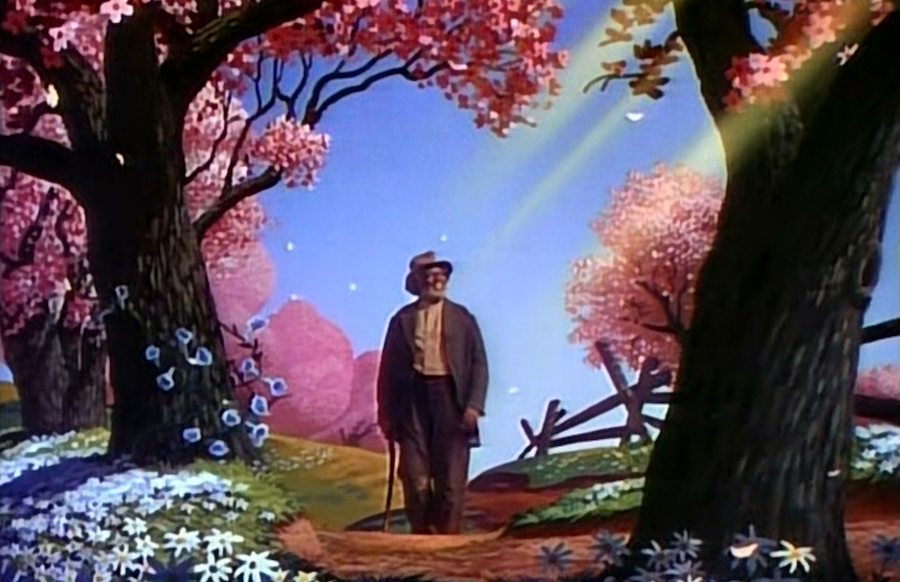
WE’RE HEADIN’ FOR THE LAUGHIN’ PLACE!

It’s not like this classic Disney flick is banned. Since its premiere, Song of the South has been rereleased in theaters on several occasions, the last time in 1986. It has been made available for home viewing in Europe and Japan. But that still hasn’t happened in the U.S. In 2010, one of the studio’s hotshots said in an interview that releasing the film on DVD is being discussed, but Disney wants to do it ”the right way” and are still trying to figure out how to do it. In 2017, Whoopi Goldberg publicly supported the idea of releasing the film.
It’s obvious that Song of the South remains Disney’s most controversial feature.
Finding Uncle Remus in a cabin
Shortly after the end of the Civil War, seven-year-old Johnny (Bobby Driscoll) is headed to his grandfather’s plantation outside of Atlanta together with his parents for a vacation. He’s saddened to learn that his father must return to the city for work, but he soon finds himself on a little adventure. After sneaking away from the plantation he finds Uncle Remus (James Baskett), a kind, old Black man living in a cabin on the estate. He tells Johnny wild stories about a resourceful rabbit named Br’er Rabbit who comes up with nifty ways to escape dangers. Johnny returns to the plantation, but in the coming days he will not only hear more stories from Uncle Remus, but also befriend other kids who are not always popular with his mother…
A romanticized view of the old South
Set during the Reconstruction era, the film presents a romanticized view of the old South where all the heartbreak from slavery and the war has been conveniently hidden away. Obviously, the filmmakers have been careful to present race relations in a positive light, where white and Black men and women work together and are equal, but it doesn’t ring true – we know it’s false. This is certainly not what the South looked like during Reconstruction. Every Black character is also a stereotype, including Uncle Remus, in spite of Baskett’s excellent breakthrough performance. Disney set out to do something decent, and it didn’t strike everybody as racist back in 1946, but Song of the South is hopelessly naive and quickly looked awfully dated, suffering even more than Gone With the Wind (1939), which hasn’t been shelved in the same way.
As a forerunner to Mary Poppins (1964), the movie was technically significant
That said, there are obviously qualities to the film. It’s a charming picture for children, based on stories by Joel Chandler Harris who collected them from Georgia plantations, preserving an oral tradition stretching back God knows how many centuries in Africa. Those stories are animated in the film, directed by Wilfred Jackson (Harve Foster handled the live action), and are lively and amusing; the most memorable scene comes when Uncle Remus starts singing what turned out to be one of Disney’s biggest hits, ”Zip-a-Dee-Doo-Dah”, and becomes one with the animated landscape. As a forerunner to Mary Poppins (1964), the movie was technically significant.
During the making of the film, Walt Disney claimed to be aware of how Song of the South could be perceived, but never did enoughto ease tensions. The NAACP were denied requests to read the treatment; co-writer Maurice Rapf, who was hired to make sure the film didn’t become ”Uncle Tomish”, was eventually kicked out. It’s a shame.
Song of the South 1946-U.S. Part Animated. 94 min. Color. Produced by Walt Disney. Directed by Wilfred Jackson, Harve Foster. Screenplay: Dalton Reymond, Morton Grant, Maurice Rapf. Stories: Joel Chandler Harris. Song: ”Zip-a-Dee-Doo-Dah” (Allie Wrubel, Ray Gilbert). Cast: Ruth Warrick (Sally), James Baskett (Uncle Remus), Bobby Driscoll (Johnny), Luanna Patten, Lucile Watson, Hattie McDaniel.
Trivia: Baskett also provides the voices of Br’er Fox and Br’er Rabbit in one of the animated segments. Paul Robeson was considered for the part of Uncle Remus.
Oscar: Best Original Song; Baskett also received an honorary award for his work.
Last word: “Walt got pretty irritated with us on Song of the South because of how carefully we were planning all this, and how carefully we supervised what was done on the live‑action set. Walt didn’t like it; he thought we were spending too much money on the live-action part of the combination scenes. I think Walt was 100 per cent wrong only that particular time, which is why we went ahead and did it anyway, and got scolded. I don’t think we could have gotten the result we did without that careful planning.” (Jackson, interview with Michael Barrier and Milton Gray)
